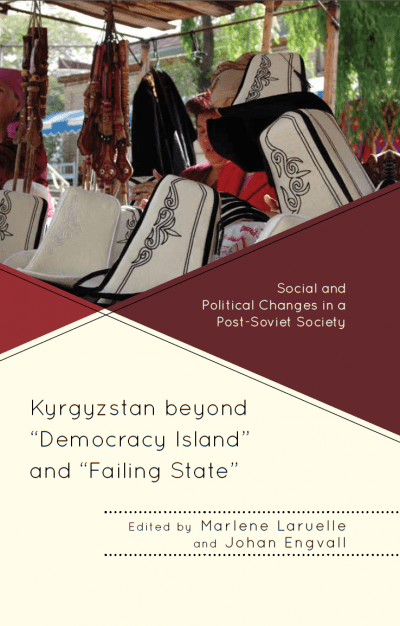Kyrgyzstan beyond “Democracy Island” and “Failing State”. Social and Political Changes in a Post-Soviet Society
EDITED BY MARLENE LARUELLE AND JOHAN ENGVALL – CONTRIBUTIONS BY DIANA ASANALIEVA; AISALKYN BOTOEVA; ASEL DOOLOTKELDIEVA; JOHAN ENGVALL; DAVID GULLETTE; JOHN HEATHERSHAW; SHAIRBEK JURAEV; MARLENE LARUELLE; ERICA MARAT; DAVID W. MONTGOMERY; EMIL NASRITDINOV; MADELEINE REEVES; ELMIRA SATYBALDIEVA; REGINE A. SPECTOR AND BERMET ZHUMAKADYR KYZY
Kyrgyzstan is probably the best known of any central Asian country, the one that has elicited the most academic publications, reports by NGOs or advocacy groups, and op-eds in the media. The country opened up massively to Western influence through development aid for civil society and for economic reforms, faced two revolutions in 2005 and 2010, and experienced bloody interethnic conflict in 2010. Kyrgyzstan is therefore commonly studied as a twin case: that of having been, for more than two decades, both an “island of democracy” in Central Asia—and the only country of the region to have made the transition to a parliamentary regime—and the archetypical example of a “failing state,” one marked by endemic corruption, criminalization of the state apparatus, and collapse of public services. This volume goes beyond these two clichés and provides a research-based and unideological narrative on the country. It identifies political dynamics, their powerbrokers, and the role of international organizations; investigates the profound social transformations of both the rural and the urban worlds; and examines the broad feeling, by local actors, that Kyrgyzstan’s fragile state identity should be consolidated. This book gives the floor to the new generation of scholars whose long-term vernacular-language field research made it possible to provide new interpretative prisms for the complex evolution of Kyrgyzstan.
